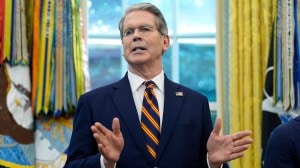Singapore issues put on backseat
The four Singapore issues, which are partly responsible for the current stalemate in World Trade Organisation negotiations, continue to occu...

The four Singapore issues, which are partly responsible for the current stalemate in World Trade Organisation negotiations, continue to occupy the backseat in the on-going discussions. Informal consultations are taking place only on trade facilitation which is the least controversial of the four while the remaining three including investment, competition policy and government procurement, are not being touched.
Even in the area of trade facilitation not much progress seems to have been made with some members, including India, insisting on further clarifications. According to a report on consultations on trade facilitation modalities by WTO deputy director general Rufus Yerxa, who currently holds the charge for carrying out discussions, a number of members still have significant concerns and questions that they feel must be clarified in order to enable them to agree to the launching of negotiations. The Singapore issues derive their name from the Singapore ministerial meeting in 1996 where study groups were appointed to examine the effect of multilateral pacts on the four issues.
The refusal of least developed and developing countries to give in to the EU demand of starting multilateral negotiations on the issues was partially responsible for the collapse of the WTO ministerial meeting in Cancun last September.Yerxa’s report points out that in the area of trade facilitation some evolution has been noticed in the positions of members since the December and February General Council meetings. Several countries actively supported such talks, and expressed support for the modalities set forth in the draft ministerial text circulated in Cancun.
However, he added that the critical factor was that many members still had significant concerns that they feel must be clarified. These delegations still need a clearer picture of what these talks aim to achieve and how the burdens of assuming new obligations will be addressed. The report added that while the delegations which had met thus far had had a constructive discussion of the issues related to trade facilitation, there was a need to have a more systematic discussion with full transparency and contribution from all the members.
While many LDCs and developing countries do not have a problem with the concept of trade facilitation which would help all members to export and import more smoothly, the building of capacities is the main area of concern. The countries claim that they will find it difficult to find the resources to introduce new technology for facilitating trade in ports and other related areas.
Photos





- 01
- 02
- 03
- 04
- 05


























